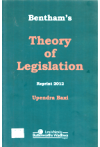- Author(s): Jeremy Bentham
- Publisher: LexisNexis
- Edition: 11 Ed Rp 2012
- ISBN 13 9788180385551
- Approx. Pages 295 + contents
- Format Paperback
- Delivery Time 3-5 working days (within Kerala & South India) (Others 7-9 days)
............................................................................................................................
Contents
Introduction by Upendra Baxi
Principles of Legislation
I - The Principle of Utility
II - The Ascetic Principle
III - The Arbitrary Principle; or, the Principle of Sympathy and Antipathy
IV - Operation of these Principles upon Legislation
V - Further Explanations—Objections Answered
VI - The Different Kinds of Pleasures and Pains
VII - Pains and Pleasures Considered as Sanctions
VIII -The Measure of Pleasures and Pains
IX - Circumstances which affect Sensibility
X - Analysis of Political Good and Evil—How they are Diffused through Society
XI - Reasons for Erecting Certain Acts into Offences
XII - The Limits which Separate Morals from Legislation
XIII - False Methods of Reasoning on the Subject of Legislation
Principles of the Civil Code
Introduction by Dumont
Part First - Objects of the Civil Law
I - Rights and Obligations
II - Ends of Civil Law
III - Relations between these Ends
IV - Laws Relatively to Subsistence
V - Laws Relatively to Abundance
VI - Pathological Propositions upon which the Good of Equality is founded
VII - Of Security
VIII - Of Property
IX - Answer to an Objection
X - Analysis of the Evils which result from Attacks upon Property
XI - Opposition between Security and Equality
XII - Means of Uniting Security and Equality
XIII - Sacrifice of Security to Security
XIV - Of some Cases liable to be contested
XV - Examples of Attacks upon Security
XVI - Forced Exchanges
XVII - Power of the Laws over Expectation
Part Second - Distribution of Property
I - Titles which Constitute Property
II - Title by Consent
III - Title by Succession
IV - Testaments
V - Rights to Services—Methods of Acquiring Them
VI - Community of Goods, or Tenancy in Common—Its Inconveniences
VII - Distribution of Loss
Part Third - Rights and Obligations Attached to Several Private Conditions
Introduction
I - Master and Servant
II - Of Slavery
III - Guardian and Ward
IV - Father and Child
V - Of Marriage
Principles of the Penal Code
Part First - Of Offences
Introduction
I - Classification of Offences
II - Sub-Division of Offences
III - Some Other Divisions
IV - Evil of the Second Order
V - Evil of the First Order
VI - Of Intention
VII - Position of the Delinquent; Its Effect on Alarm
VIII - The Influence of Motives upon the Greatness of Alarm
IX - Facility or Difficulty of Preventing Offences— Their Influence on Alarm
X - Effect Produced upon Alarm by greater or less Facilities for Secrecy
XI - Effect of the Delinquent's Character upon Alarm
XII - Cases in which there is no Alarm
XIII - Cases in which there is Greater Danger than Alarm
XIV - Grounds of Justification
Part Second - Political Remedies against the Evil of Offences
I - Subject of this Part
II - Direct Means of Preventing Offences
III - Of Chronic Offences
IV - Suppressive Remedies, for Chronic Offences
V - Observations' upon Martial Law
VI - Nature of Satisfaction
VII - Reasons on which the Necessity of Satisfaction is founded
VIII - The Different Kinds of Satisfaction
IX - The Quantity of Satisfaction
X - The Certainty, of Satisfaction
XI - Pecuniary Satisfaction
XII - Restitution in Kind
XIII - Attestatory Satisfaction
XIV - Honorary Satisfaction
XV - Remedies for Offences against Honour
XVI - Vindictive Satisfaction
XVII - Substitutive Satisfaction; or, Satisfaction at the Charge of a Third Party
XVIII - Subsidiary Satisfaction at the Public Expense
Part Third - Of punishments
I - Punishments which ought not to be inflicted
II - Proportion between Offences and Punishments
III - Of Prescription as Regards Punishments
IV - Mistaken Punishments, or Punishments Misapplied
V - Of Requiring Security for Good Behaviour
VI - The Choice of Punishments
VII - The Kinds of Punishments
VIII - Justification of Variety in Punishments
IX - Examination of some Common Punishments
X - Of the Pardoning Power
Part Fourth - Indirect Means of Preventing Offences
Introduction
I - Means of taking away the Physical Power to do harm
II - Prohibition of Acquiring Knowledge which may be turned to a Bad Purpose
III - Indirect Means of Preventing the Wish to Commit Offences
IV - To Change the Course of Dangerous Desires, and to Direct the Inclinations
towards Amusements Conformable to the Public Interest
V - To Satisfy Certain Desires without Injury, or with the Least Possible Injury
VI - To Avoid Furnishing Encouragement to Crime
VII - To Increase Responsibility in Proportion as Temptation Increases
VIII - To Diminish the Sensibility to Temptation
IX - To Strengthen the Impression of Punishments upon the Imagination
X - To Facilitate Knowledge of the Fact of an Offence
XI - To Prevent Offences by giving to many Persons an Interest to Prevent Them
XII - To Facilitate the Means of Recognizing and Finding Individuals
XIII - To Increase the Difficulty of Escape
XIV - To Diminish the Uncertainty of Prosecutions and Punishments
XV - To Prohibit Accessory Offences in order to Prevent the Principal Offence
XVI - Cultivation of Benevolence
XVII - Employment of the Motive of Honour, or the Popular Sanction
XVIII - Employment of the Motive of Religion
XIX - Use to be made of the Power of Instruction
XX - Use to be made of the Power of Education
XXI - General Precautions against Abuses of Authority
XXII - Means of Diminishing the Bad Effects of Offences—General Result
and Conclusion
Index
............................................................................................................................

